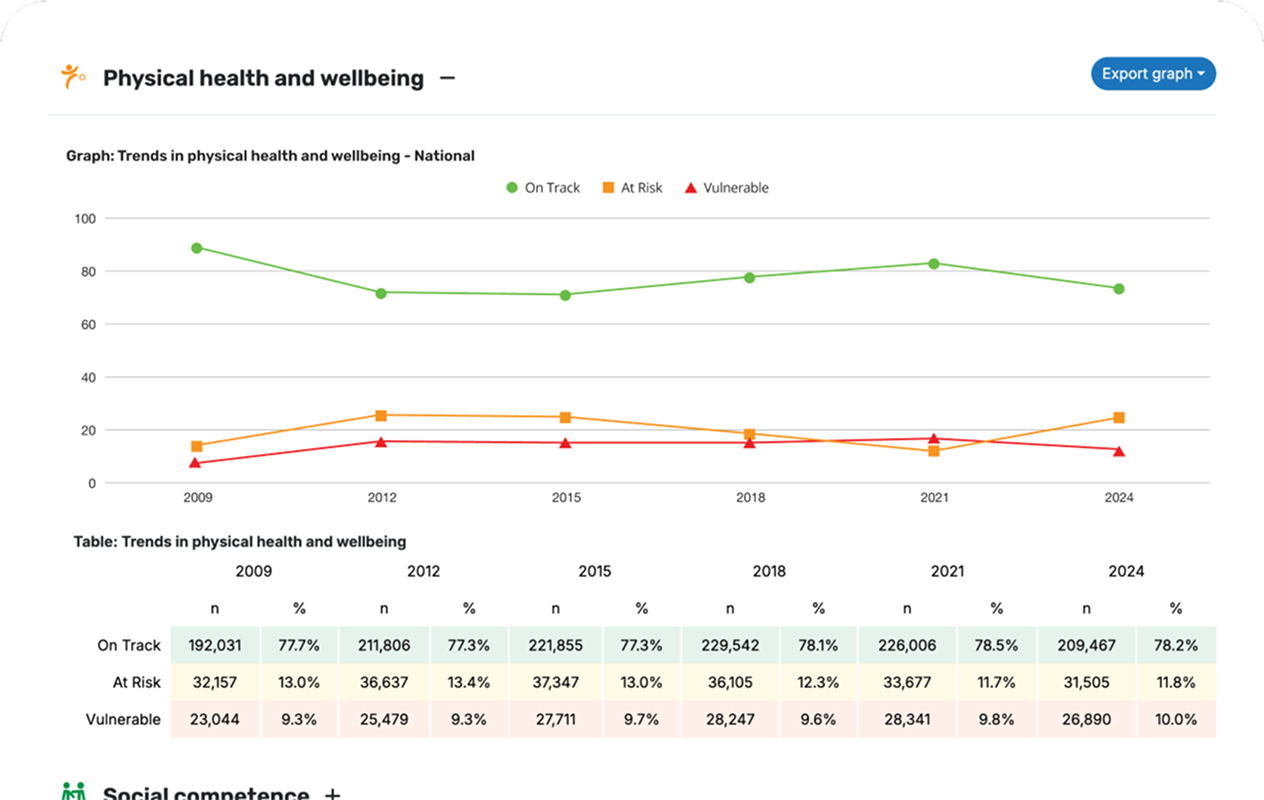
Date: January 2024
AEDC Cycle: Cycle 1 (2009), Cycle 2 (2012), Cycle 3 (2015), Cycle 4 (2018), Cycle 5 (2021)
States: SA
Data Linkage Project: Yes
Organisation: University of Adelaide
Date: January 2024
AEDC Cycle: Cycle 1 (2009), Cycle 2 (2012), Cycle 3 (2015), Cycle 4 (2018)
States: NSW
Data Linkage Project: Yes
Organisation: Children’s Hospital at Westmead Clinical School, University of Sydney
Recently a National Strategic Action Plan for Childhood Heart Disease was devised to reduce the impact of CHD in Australia and achieve the goal that people with CHD live longer. The Action Plan identified needs in clinical and research areas. It highlighted research priorities including: identify the burden of neurodevelopmental, psychosocial, poor mental health and economic factors on patients with CHD in order to improve the quality of life of CHD patients and their families; identify the health factors that impact CHD pre- and post-natally to inform evidence base and transform care; and understand Australian-relevant epidemiology to determine effective interventions.
This project aims to examine the health service utilisation, costs, ongoing health, neurodevelopmental and cognitive outcomes for children with a diagnosis of CHD. Children with CHD will be identified in the Kids Heart Biobank and hospital discharge data and outcome data concerning health (hospitalisation, procedures, Medicare, PBS), early child development, school test (NAPLAN) and survival of individuals with CHD will be identified from administrative datasets.
Date: January 2024
AEDC Cycle: Cycle 1 (2009), Cycle 2 (2012), Cycle 3 (2015), Cycle 4 (2018)
States: QLD
Data Linkage Project: Yes
Organisation: The University of Queensland
In view of the very low mortality in Paediatric ICU (PICU), the lack of long term data on the impact of critical illness in children represents a major knowledge gap. Better data are required to identify groups at highest risks and those most likely to benefit from protective interventions in order to achieve the substantial improvements in PICU outcomes over the next decade. It is anticipated that this study will demonstrate the usefulness of linkage of ANZICS PICU registry data to these other sources and is likely to be a precursor to further studies at state-wide and national level.
Date: January 2024
AEDC Cycle: Cycle 1 (2009), Cycle 2 (2012), Cycle 3 (2015), Cycle 4 (2018)
States: ACT
Data Linkage Project: Yes
Theme(s): Geographic area specific research
Organisation: National Centre for Epidemiology and Population Health, Australian National University
The primary goal of the data linkage study is to examine whether adverse health outcomes potentially associated with PFAS exposure are more common among people who have lived in the PFAS Investigation and Management Areas of Williamtown, Oakey and Katherine (exposed), than among people who have lived outside these areas (non-exposed), after accounting for sociodemographic characteristics.
Date: January 2024
AEDC Cycle: Cycle 1 (2009), Cycle 2 (2012), Cycle 3 (2015), Cycle 4 (2018)
States: SA
Data Linkage Project: Yes
Organisation: Cancer Council SA
This study aims to address this dearth in research by utilising longitudinal population-based linked data to investigate developmental outcomes of early childhood cancer survivors in their first year of school. Specifically, it will investigate cognitive, physical, and emotional developmental outcomes in South Australian (SA) early childhood cancer survivors aged 2 – 9 years.
The objectives are to:
1. Describe the population of childhood cancer survivors in terms of cancer information, demographics and other characteristics.
2. Compare developmental outcomes between childhood cancer survivors and matched controls.
3. Determine differences in developmental outcomes among childhood cancer survivors in terms of cancer data and demographic characteristics.
Community Data Explorer
Navigate the AEDC Community Data Explorer and understand the data.
